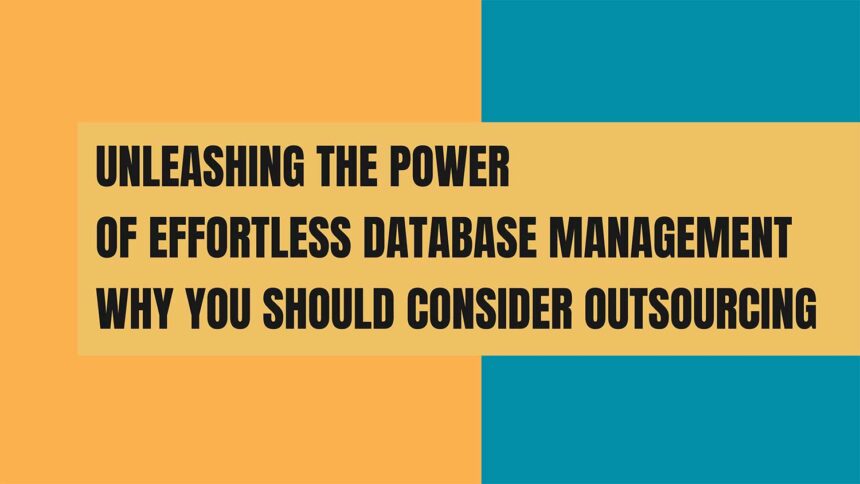Data is essential to fueling decision-making, innovation, and customer engagement. Database administration is critical for guaranteeing the smooth flow of information throughout a business.
It ensures storing important information for decision-making, customer interaction, and innovation. A well-managed database provides data accuracy, accessibility, and security, which has an impact on overall corporate success.
Nevertheless, database management’s complexities can be intimidating, diverting valuable resources away from vital business tasks. Outsourcing comes into play here, providing a strategic approach to unleash the power of seamless database management.
In this post, we will look at the benefits of outsourcing as well as the overall cost-effectiveness that it provides. Furthermore, we will discuss how outsourcing can drastically reduce database administration risks.
Core vs Chore
An organization must distinguish between core and chore. Database administration, for example, is a core activity that directly contributes to an organization’s goal and value proposition.
Outsourcing this task helps firms focus on their core competencies while experts manage the complexity of database upkeep.
However, there has to be an appropriate mix of services across support domains, such as application management, database administration, and specialist functional assistance.
It will lead to a focused and dependable workforce, which may free up internal resources to focus on more critical initiatives and significantly influence a business’s agility and competitiveness.
Better Results, More Value with Less Resources
Outsourcing database administration can help firms improve their performance and value by hiring qualified individuals knowledgeable about the newest technology and best practices.
When you select the perfect outsourced team for remote database and application management, you often get more out of the resources at your disposal, such as on-demand access to a senior-level specialist, which saves you the time and capital ordinarily necessary.
Choosing the proper partner with a managed service provides access to the specialized individual for the work anytime it is required, eliminating the need to search for or hire other external consultants.
Providing the Best Available Talent
Individual firms may need help in recruiting and maintaining talented employees. It creates a need for outsourced database administration as it helps companies stay competitive, due to the access to top-tier staff.
Outsourcing database management from a certified provider provides you with continuous access to a seasoned team of IT industry experts. It helps your company stay competitive in the database management market.
The outsourced partners invest in hiring and retaining top-tier employees to guarantee that their databases are managed by qualified professionals who are up to date on the newest technology, security standards, and industry best practices. It ensures quality service provision, which is handy for your company’s growth.
Cost-Effective
Cost concerns are critical in company decisions. Many businesses find that outsourcing database management is a cost-effective alternative. This is because when database administration options such as Heroku alternatives is outsourced, it relieves the organization of the requirement of a team to set up and maintain its database infrastructure.
Utilizing free Heroku alternatives provides the business with managed databases that ensure continuous service delivery, integration and tailored packages depending on each client’s needs and scale.
This adaptability enables organizations to pay only for the services they utilize, reducing excessive overhead costs. Furthermore, service providers’ economies of scale assist clients by giving them access to high-end technologies and knowledge at a fraction of the cost.
Consistency
Companies must balance the importance of consistency in database administration. Outsourcing partners ensure that database operations function smoothly around the clock by providing constant service. This constancy is challenging with in-house teams, especially given staff turnover, vacations, and other disturbances.
Outsourcing companies frequently use Service Level Agreements (SLAs) to guarantee a certain level of performance and response time. This dedication to consistency provides businesses with peace of mind, knowing that their databases are in capable hands and are managed to the most excellent standards constantly.
Availability
Because of the 24/7 nature of the digital ecosystem, databases must be open and accessible at all times. Outsourcing database administration promotes ongoing availability because service providers are prepared to resolve issues quickly and efficiently, even after usual business hours.
This around-the-clock assistance is critical for firms with a global presence or those working in industries where downtime can be disastrous. Outsourcing partners invest in robust infrastructure and support systems to ensure high availability, reducing the risk of business disruptions.
Efficiency
Outsourcing database administration is all about efficiency. Service providers have the most up-to-date tools and technologies for automating regular activities, optimizing database performance, and proactively identifying and addressing issues. This preventative approach reduces downtime, performance degradation, or security breaches.
Outsourcing also enables scalability, allowing firms to adjust to changing data volumes and requirements without spending heavily on infrastructure and personnel. The outsourced database administration solution can smoothly scale to suit more significant data volumes and complexity as the organization grows.
Reduces Risk
Database administration is an essential component of business operations since it involves mitigation of risks such as data breaches, system failures, and compliance difficulties. Outsourcing partners are committed to reducing these risks by implementing strict security processes, disaster recovery plans, and industry standards.
They use advanced security procedures, encryption technology, and regular audits to maintain database security and compliance. These outsourced specialists combine educated staff with cutting-edge technology to reduce client risks.
It ensures that they offer patch installation, backup upgrades, and fast identification of infrastructure concerns that could lead to crashes, hardware failures, or database corruption.
Conclusion
Outsourcing database administration is a strategic decision that allows firms to concentrate on their core competencies and generate better outcomes.
If you want to unleash the power of seamless database administration and stay ahead in a competitive business environment, consider outsourcing.











